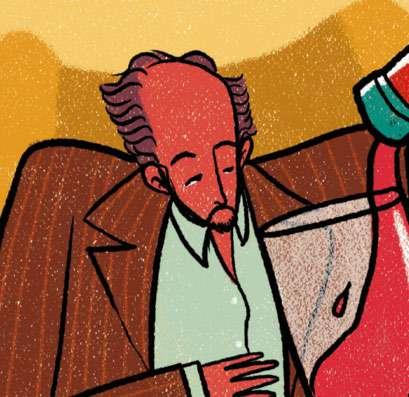APUNTES T h e Big Sc reen
EDUARDO MARÍN CONDE
EL CINE Y EL VINO, A SORBOS Sipping on Movies La intensa relación del ser humano con el vino ha conformado icónicas imágenes cinematográficas. Una amplia variedad de filmes han reflejado el cúmulo de sensaciones que el vino ha significado en nuestras vidas: la satisfacción de encontrar un verdadero gozo como privilegio de nuestras existencias, como lo retrató la entrañable Sideways, una de las obras que mejor ha expresado ese resorte emocional que representa el vino. Dirigida por Alexander Payne, basada en la novela de Rex Pickett, fue recompensada merecidamente con el Óscar a mejor guion en 2005. El vino ha simbolizado, desde hace más de 5,000 años, fraternidad y un vínculo de amistad; ha sellado pactos y alianzas, y ha fortalecido lazos. Pero, sobre todo, ha simbolizado el disfrute de la vida. Así, en el cine épico sobre el imperio romano, ha sido común ver a la poderosa nobleza bebiendo vino en elegantes copas con recubrimiento de oro: Gladiator, Julius Caesar, The Fall of the Roman Empire, Quo Vadis… Todo encuentro fraternal se cerraba con un brindis, como en la emocionante Ben Hur cuando Charlton Heston se reencuentra con Stephen Boyd, antes de los trágicos sucesos que los convertirán en míticos enemigos mortales. El vino también ha sido parte indisoluble de filmes que retratan el hedonismo de la aristocracia imperial francesa o británica, como Barry Lyndon o Dangerous Liaisons. Al pensar en el simbolismo que el vino ha tenido en el cine, me viene a la mente inmediatamente el sutil, sensible relato de la danesa Babette’s Feast, ganadora del Óscar a mejor película extranjera, la cual como pocas, ensalza los atributos del arte culinario y la delicia del vino, que como decía Dante, siembra poesía en los corazones. 108
The intense relationship between human beings and wine has been the subject of iconic cinematographic images. A wide variety of films have reflected the cumulus of sensations that wine has meant in our lives: the satisfaction of finding true joy as the privilege of our existence, as depicted in the loveable Sideways, one of the best artistic portrayals of the emotional springboard that wine has come to be. Directed by Alexander Payne and based on the novel by Rex Pickett, it was deservedly awarded the Oscar for best screenplay in 2005. For more than 5,000 years, wine has been a symbol of fraternity and the bonds of friendship. It was with wine that pacts and alliances were forged and connections where strengthened. But it has especially symbolized enjoyment of life. In epic Roman Empire cinema, it’s common to see powerful nobility drinking from gold-coated glasses: Gladiator, Julius Caesar, The Fall of the Roman Empire, Quo Vadis? Every fraternal encounter ends with a toast, like when, in Ben Hur, Charlton Heston has a reencounter with Stephen Boyd, before the tragic events that would turn them into mythical mortal enemies. Wine has also been an undilutable part of movies depicting the hedonism of the French and British imperial aristocracies, such as Barry Lyndon or Dangerous Liaisons. When thinking about the symbolism wine has had in the movies, the subtle, sensitive tale of the Danish Babette’s Feast comes to mind. This Oscar-winner for best foreign film glorifies the attribute of the culinary arts and the delights of wine like few others. Like Dante said, they plant poetry in the hearts of men. What’s better than sitting down to share a bottle of wine with friends at the end of the day?, asked James Joyce. Wine is
AIR E MAYO 20 21
AIR-93-APUNTES-CINE.indd 108
4/19/21 14:38







